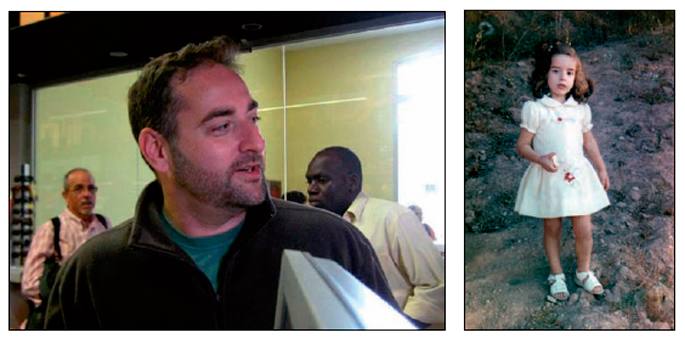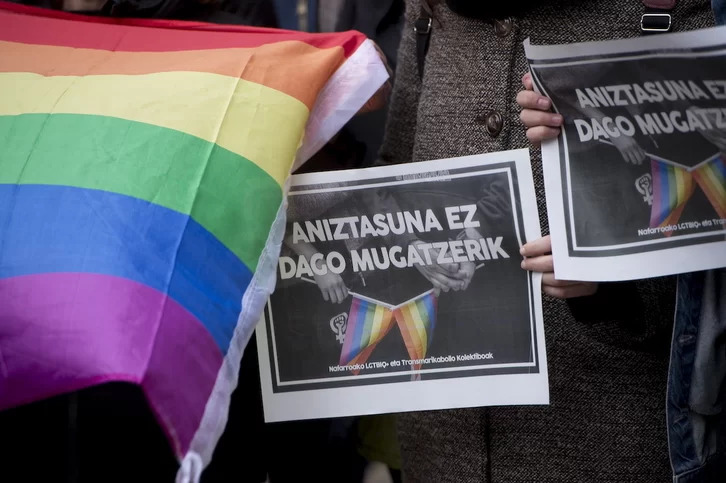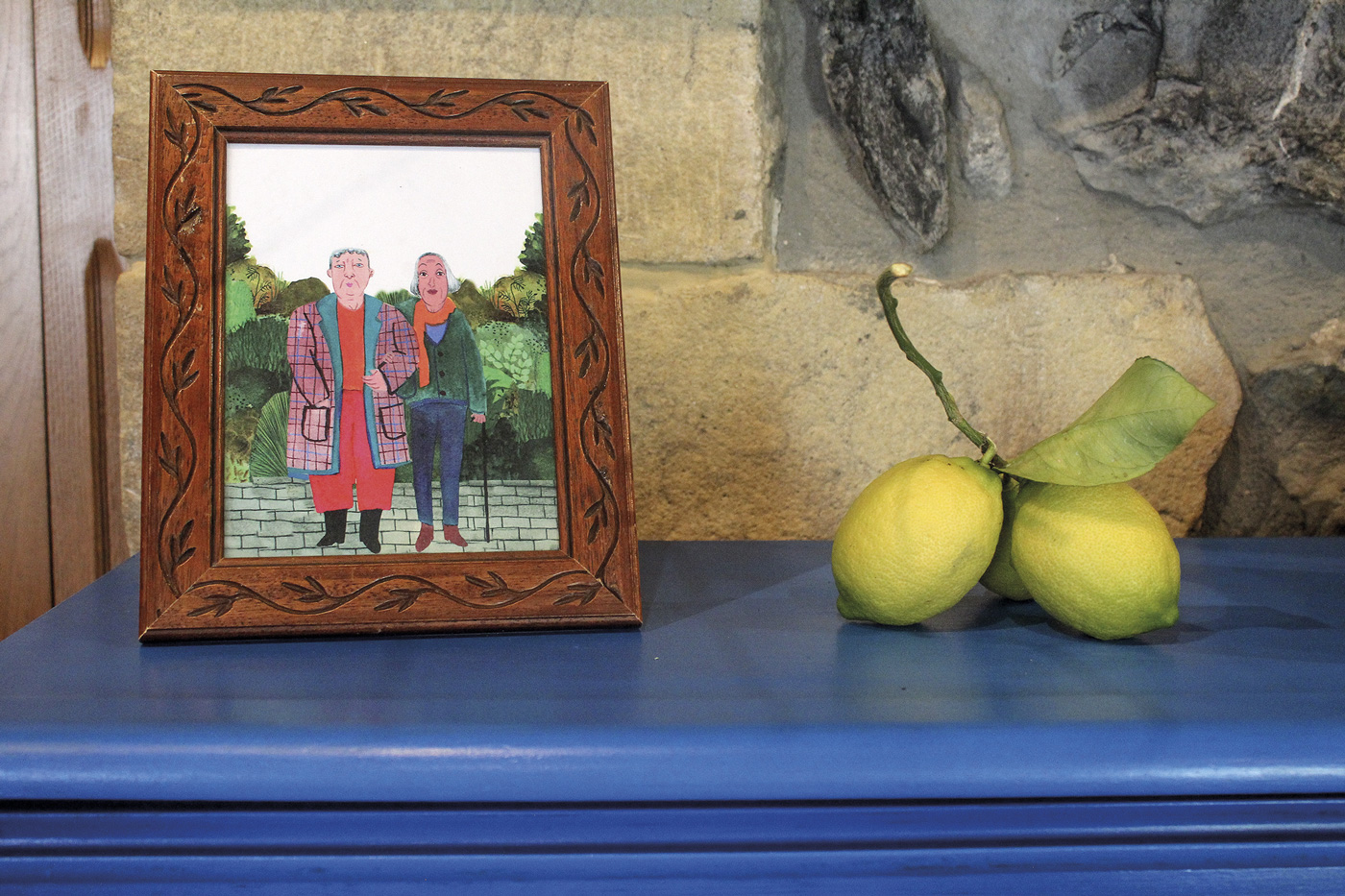The anguish to decide if you are a child
- Are you a boy or a girl? Well, I don't know, at least you don't notice it. People who are born with some disorder in sexual development are not noticed sex through a superficial examination. In Western cultures that we like to clearly draw the line between the two sexes, the impossibility of naming the newborn boy or girl is a huge blow, especially for parents. Rather than for the sake of the child, for years rapid decisions have been taken for the comfort of doctors and parents and wrong operations have been carried out. Fortunately, the living conditions of people born with sexual development disorder have improved and the rights of the newborn have been placed in the centre.

Gabriel José Martín was born in San Fernando, province of Cadiz, Spain, in 1971. It is born with a disorder of sexual development (DGS). One in ten million men had the same thing: external sexual organs seemed female. The doctors determined she'd be a girl. His parents called him Patricia and educated him as a child. She had never felt herself, I had always believed she was a boy, but then I didn't understand why. Being educated as a child and having a kid's attitude, as she says, caused him many problems.
I hated dolls, dresses and wedding games. It was useless to tell him that he wanted to play football or police games, so as not to be ashamed of the people his mother had communicated to him several times. In adolescence he developed as a man, “because he was like this”, and his beard, his hair on his body, and his penis grew. Adolescence was hard for Martín, from 12 to 18 years old. He suffered all kinds of harassment and expulsions at school. My parents did not take him to the doctor until he was 18 years old, “although it was obvious that something was going on very rare for me.” Today he has no relationship with his parents, who in his opinion are so fragile, instead of helping, they left him in the spotlight of the humiliations and aggressions of the city of 100,000 inhabitants.
But he was also lucky. He met a good endocrine doctor, made him the right diagnosis, and he helped him change sex in the civil registry. In 1991 he was legally recognized as a man since his birth. He erased Patricia and wrote to Gabriel José. It has been introduced five times in the operating room for the repair of sexual organs, but surgeons have not been able to do much, as they have been intervened in adults and in the sexual organs of people with DGS little can be done in adulthood.
Women and men will not have to register in Germany
An activist suffering from a disorder in sexual development reported to the UN that he was operating to avoid sexual ambiguity in infants and in the European Union (UN). The German Constitutional Court has also pulled that out and eventually the law is going to change. As of 1 November, parents of children with DGS will not have to decide whether they are boys or girls. Over the years, surely in adolescence, the young man will be able to decide whether he wants to be a boy or a girl. The aim of the change is to avoid inadequate interventions, as well as subsequent legal and bureaucratic disorders. Parents feel obliged to choose one or the other, so sometimes incorrect operations are performed and sometimes the necessary interventions are not performed. Every year 400 boys and girls are born in Germany who suffer from some disorder in sexual development. This state is the first European country to adopt this measure.
Gabriel José Martín lives in Barcelona and is a psychologist, specialist in therapy for homosexual men. She is homosexual and participates in several associations. In reviewing Germany’s decision, it has helped us to better understand the vicissitudes of people with DGS and the perceptions of society. It has not given particular importance to legislative change, but has put its emphasis on two other terms: visibility and pedagogy. Let the news from Germany serve that: that journalists start asking questions, that they explain what the DGS is, to make an event more popular with people. “When the child is born and they tell him that he is intersexual, the parents will say ‘a, yes, I know, I read it in the newspaper’. If it does not serve to reach this situation, it does not serve any purpose, it continues to stigmatize the child: ‘You who are’, ‘Indeterminate’, ‘Izorra hadi!’. If the pedagogical work is not done, Martín believes that the new law only serves to alleviate the anguish of the parents and not to make too quick decisions. The attitude of the parents should be: “I don’t want to put my foot in decisions about the child” and “How am I going to tell this so that the child is not stigmatized forever in the family and in their environment?”
For Catalan, in practice it makes no sense to be allowed to make a cross in the third box of paper, and for the SGD to decide the sex it prefers whenever it wants. She recalled Anne Fausto-Sterling's research. The U.S. biologist analyzed all cases of DGS reported between 1950 and 2000: 83. 85.54% of them agreed with the sex they were chosen when they were born. A total of 14.46% of respondents stated that they had set their foot with the sex they were given and that they wanted to change. That is, they all chose to be a man or a woman, no one remained undecided and no one made both sexes their own. To better explain his claim, Martín has set us a second example, and he has put on the table what transexual people say: sexual identity has nothing to do with the appearance of sexual organs, I can have male organs and I can feel like a woman. “Therefore, what is the point of being born with intersex organs and giving them an indefinite sexual identity, if the sexual identity is never indefinite? Queer theory, more than anything ideological movement, advocates for the elimination of male-female identification, but intersex movements are extremely rare in this type of movement”.
There's a difference, being born today or 40 years ago.
In 2006, a large number of international associations and entrepreneurs DGS collected their demands on paper. Martin attaches particular importance to the 2006 agreement, thanks to which the medical community and parents know where to turn. The agreement has four basic requests. One: Let the child not die. Malformations can endanger the life and health of the child, and the first objective is to prevent the child from dying. Two: We must ensure that the child’s urogenital apparatus does not lose its abilities and that, at the same time, it serves to give him pleasure. Three: A commitment to an adequate quality of life for the future. Four: In adulthood, they will stop doing cosmetics on their own, as they are second category.
Catalan believes that in recent years very important steps have been taken to advance the recovery. There is agreement in 2006, many demands have been made, the medical protocols are good, the children undergo more and more in-depth tests. Women with DGS are more than transsexuals (0.018% and 0.012% respectively), but today the situations of the former are well managed in the family, in the private sector and in medicine.
Why should the state know what we have between our legs?
Marina Sáenz is a Donostian transsexual. He has long left his native town and currently lives in Valladolid (Spain). He is a member of the Triangle Foundation for the Defense of the Rights of Gays, Lesbians, Bisexuals and Transsexuals and coordinator of the transsexuality area. He's a lawyer by profession. It has helped us interpret the reality of DGS from the eyes of the transsexual.
We have asked the Donostia whether the new German law is necessary or a patch, and there is no doubt. In his opinion, it is not a patchwork, crimes have been committed for decades against people with DGS, because without knowing what sexual identity they are going to develop later, they have operated and they have chosen one or the other. However, Sáenz stressed that the State continues to record both sexes: “They remain obsessed with the account of both sexes, male or female, registering and controlling. Why does the state have to walk backwards between our legs? What does it matter to be of one sex or another?” Sáenz says that the Spanish civil registration law is one of the most closed in Europe, for example, a confused name cannot be given to know the sex of the child. The model that the Donostia has reminded us has been highlighted in the novelties that Euskaltzaindia has made in his list of names. Thanks to the special situation of the Basque Country, until recently we have met boys and girls of the same name, but the separation has been made by Euskaltzaindia and it is difficult to find the newborn Ilazki.
In fact, the records of many municipalities follow the recommendations of the Royal Academy of the Basque Language.
The stagnation of the state, with Sáenz in the head, in polarizing both sexes does not like the Donostia, but recognizes that the distribution of the sexes is very interiorized in society. Males and females are at the head of society, although there are currents in favor of eliminating this polarization as areas of thought. “If I say that from tomorrow we will not register children for sex? Not even in the ID card? A lot of people would get nervous." Transsexuals are a challenge for society, the transexual woman (in the form of a man) who goes down the street with the lips painted and the skirt painted, is making a request to society: treat me as a woman.
Queer theory, for example, seems interesting to Marina Sáenz, but difficult to implement: “There are a lot of people who define themselves as men or women and you can’t tell them that what they feel is nothing but cultural. Of course, culture and training influence the interpretation of your masculinity and femininity, but that doesn’t mean that feeling a man or a woman is a cultural invention.” For Sáenz, it's about whether or not to take sexual polarization to the extreme. There are transgender people who wager on a net separation of men and women, but “I think there are perfect whites, there are perfect blacks, and many others are neither.”
DGS more protected than transsexuals
Marina Sáenz knows the transsexuality laws in Navarre and the Basque Autonomous Community well and says they are one of the best in the world. However, the attitude of public and political authorities towards those with DGS is more flexible. For example, in Hego Euskal Herria, transgender people can do operations, but they have achieved that right after many struggles. DGSs have been operating since 1950. Society also understands the situation of DGSs much better: “You tell people that DGSs have genetic malformation and ‘ah, of course, the poor!’, and for us, what are these top marimutils doing? How do you notice the operation! How bad it is!’ The tyranny of the perfect definition of sex and gender is still there.”
Sexu garapenaren desordenaren bat duenari sarri deitu zaio hermafrodita, eta azkenaldian indar handiagoa hartu du intersexual hitzak. 2006an, Lawson Wilkins Pediatric Endocrine Society (LWPES) eta European Society for Paediatric Endocrinology (ESPE) erakundeek argitaratu zuten ikerketan, sexu garapenean gertatzen diren desordenak gaixotasuntzat ez hartzea gomendatu zuten, eta hermafrodita eta intersexual hitzak ez erabiltzea. Erakundeok Disorders of Sex Development DSD terminoa proposatu zuten, aldaerak azaltzeko egokia delakoan eta gutxiesgarria ez delakoan.
Biztanleen %0,018k du sexu garapenaren desordenaren bat. SGD daukanaren sexu kromosomatikoa (XY / XX), gonadak (barrabilak eta obulutegia) eta sexu organoak (zakila eta bagina) ez datoz bat, eta beraz, ezaugarri genetikoak eta fenotipikoak, maila desberdinetan, baina gizonarenak eta emakumearenak, biak dira.
Raquel (Lucas) Platero psikologo madrildarra da. Besteak beste, bigarren hezkuntzako irakaslea da eta Lesbiana, Gay, Bisexual eta Transexualen (LGBT) eskubideen aldeko aktibista. Sexu garapenaren desordenaz (SGD) eta Alemanian hartutako erabakiaz (ikus erreportajean) galdetu diogu. Ondoko hausnarketa egin digu: “Batzuen ustez ezinezkoa izango da pertsona baten sexua zein den ez jakitea. Gerta liteke norbaiten itxura, izena edo mundu honetan bizitzeko modua bat ez etortzea Mendebaldeko kulturetan dauzkagun bi aukerekin, gizona edo emakumea izatearekin. Alabaina, pentsaezina iruditzen zaigun horrek, aurrean dugun pertsonarekin baino lotura gehiago du gure segurtasunarekin (segurtasun gabeziarekin) eta gure antolaketa sozial, ekonomiko eta politikoarekin.
Beraz, Alemaniako edo Australiako albisteek (generoa ez ezartzea edo intersexualak heldua denean erabakitzea zein sexu nahi duen) gure arau sozialak azpimarratu baino ez dituzte egiten.
Espainian, nortasun agiriak ez digu beti esan gizon ala emakume garen. Orain kaosa irudituko litzaiguke, baina banaketarik ez zegoenean kaosik ez zegoen.
Dena dela, sexuei buruz konplexutasun gehiagoz hitz egiteko balio badu ona da. Intersexualen eskubideez –erabakitzeko gaitasunik ez duen jaioberriari derrigorrez ebakuntza ez egitea, jakinda heldua denean nahi badu egingo duela– hausnartzeko balio badigu positiboa da.
Administrazioaren ikuspegitik zer egingo nukeen? Bada, pertsonaren sexuari buruzko oharra kendu egingo nuke, denon bizitza errazagoa litzateke. Intersexualak ditut gogoan, baina baita transexualak ere”.
"Pornografiaren aurrean nola esku hartu. IKTen erabilera nerabeen eta gazteen sexualitateen arretan: errealitateak eta aukerak" ikastaroa emango du Ane Ortiz Ballesterosek (1989, Bilbo). Sexologoa da bera, Training sexologia klinikoan, Genero Berdintasun Teknikaria eta... [+]
1984an ‘Bizitza Nola Badoan’ lehen poema liburua (Maiatz) argitaratu zuenetik hainbat poema-liburu, narrazio eta eleberri argitaratu ditu Itxaro Borda idazleak. 2024an argitaratu zuen azken lana, ‘Itzalen tektonika’ (SUSA), eta egunero zutabea idazten du... [+]
La bajona kolektibo kide Heiko Elbirak salatu du psikiatriak zisheteroarautik aldentzen diren erotikak kontrolatu nahi dituela.
Young people start consuming pornography before, as porn is their only sex education. How on earth have we come here?
Today, it has to be acknowledged that thanks to the Internet it is much easier to see pornography. Unfortunately, through a click, the 7-9 year-old boy comes to... [+]
Zamora, late 10th century. On the banks of the Douro River and outside the city walls the church of Santiago de los Caballeros was built. The inside capitals of the church depict varied scenes with sexual content: an orgy, a naked woman holding the penis of a man… in the... [+]
























